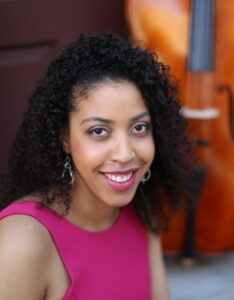Editor’s Note: Prior to the 2024 Conference, Harvard Law student Krysta Hyppolite, a cellist, reached out to ICSOM Counsel Kevin Case to discuss his experience as a labor attorney representing musicians across American symphony orchestras. Given her background and interest in the field, the Governing Board sponsored Krystaʻs attendance at the conference and asked her to write a column describing her experience in Senza Sordino.

Photo Credit: Briana Matthew
My desire to go to law school was motivated by my experience working as a cellist. I love playing the cello; however, I feel frustrated with many aspects of the industry and I want to be able to advocate for my fellow musicians and my art form, in addition to performing. Fast forward to the spring semester of my second year of law school. My cello teacher, Amy Baumgarten of the Kennedy Center Opera House Orchestra, told me about a lawyer named Kevin Case whose practice primarily focuses on negotiating collective bargaining agreements for symphony and opera musicians.
Like me, Kevin is a musician who seeks to use the law to be an advocate for other musicians and for the art of classical music. I sent Kevin an email asking to learn more about his practice and how he balances practicing law with playing music. Not only did Kevin meet with me to share information about his practice and professional experience, he suggested to the Governing Board that they invite me to the conference in Portland as an observer. The Governing Board agreed and provided a stipend to help cover some of my costs to attend.
It was important for me to attend the conference for my own personal development and to bring what I learned back to the legal community. Almost every experience I’ve had relating to the representation of musicians in law school has focused on copyright law. However, my own experience and conversations with musicians have revealed that most musicians are more concerned with labor protections, not intellectual property ones.
The conference gave me a variety of new insights regarding labor law and the ethics that lawyers must consider when negotiating on behalf of orchestral musicians. For example, the ethical decision a lawyer must make to represent individual section members who want to negotiate contracts with a higher salary than other section members. Higher pay for one musician often means someone else will receive less than they otherwise would. A lawyer who represents an entire orchestra membership must consider whether such representation of one member would adversely affect the entire group.
In addition to thinking about issues from a lawyer’s perspective, I also considered them from the musician’s perspective—it is important for orchestra members to consider the role of the union as an advocate for all members when requesting union assistance in disputes with fellow colleagues. For example, if an orchestra member makes a sexual harassment charge against another member, the union has a duty to represent both the accuser and the accused. The union takes several measures to ensure that each person is represented fairly. This is a topic that I had not considered while playing in orchestral settings, and it would not be the first thing that comes to mind if I desired to request assistance in a dispute against another musician. This particular example illustrates the importance of educational resources for musicians to make informed decisions in their workplaces.
I believe that it’s essential for lawyers and other advocates for musicians to have a deep understanding of the industry and what it is like to be a working musician. In my experience in law school and working in several law firms, that understanding is missing. Attending the conference in Portland has given me a new perspective that I hope will make me a better advocate for musicians. It has also allowed me to bring back more nuanced insights to my law school to help other law students understand the issues that are important to ICSOM and its members.
Thank you ICSOM for investing in my educational and professional development by sponsoring my attendance at the conference.





